
INTERNATIONAL ARCHIVES OF OCCUPATIONAL AND ENVIRONMENTAL HEALTH
Scope & Guideline
Connecting Research to Real-World Health Solutions
Introduction
Aims and Scopes
- Occupational Health Risks and Management:
The journal addresses various health risks associated with occupational exposure to hazardous environments, including chemicals, biological agents, and physical stressors, focusing on their assessment and management strategies. - Environmental Health Impacts:
Research on the impacts of environmental factors, such as air pollution and climate change, on worker health and safety is a core aspect, with studies often examining the long-term health outcomes of exposure to these environmental stressors. - Psychosocial Factors in the Workplace:
The journal explores psychosocial factors affecting worker health, including stress, mental health issues, work-life balance, and organizational culture, emphasizing their role in overall employee well-being. - Epidemiological Studies and Research Methodologies:
It publishes studies employing various epidemiological methods, including longitudinal studies, cross-sectional surveys, and meta-analyses, to provide robust evidence on occupational and environmental health issues. - Intervention Studies and Health Promotion:
The journal also emphasizes the importance of intervention studies aimed at improving workplace health through various strategies, including health promotion programs, ergonomic assessments, and policy evaluations.
Trending and Emerging
- Impact of Remote Work:
The shift towards remote and hybrid work models, accelerated by the COVID-19 pandemic, has prompted an increase in research examining the mental health implications and ergonomic challenges associated with working from home. - Mental Health and Well-Being:
There is a growing emphasis on understanding mental health issues in the workplace, including burnout, stress, and the impact of workplace bullying, reflecting a broader recognition of mental health as a critical component of occupational health. - Environmental Exposures and Health Outcomes:
Research linking environmental exposures, such as air pollution and climate change, to health outcomes among workers is increasingly prevalent, indicating a trend towards integrating environmental health with occupational health. - Use of Innovative Technologies:
Emerging studies utilize innovative technologies, such as wearable devices and mobile health applications, to monitor and improve worker health, suggesting a trend towards personalized and data-driven health interventions. - Diversity and Inclusion in Occupational Health:
Research focusing on the health impacts of diversity and inclusion within workplaces is gaining traction, highlighting the importance of understanding how different demographic factors influence health outcomes and workplace experiences.
Declining or Waning
- Traditional Occupational Hazards:
Research focusing solely on traditional occupational hazards, such as noise and vibration exposure, has seen a decrease, possibly due to the increasing complexity of occupational health issues requiring multifaceted approaches. - Single-Agent Exposure Studies:
There is a noticeable decline in studies that isolate the effects of single-agent exposures, as there is a growing recognition of the need to understand the cumulative and synergistic effects of multiple exposures in occupational settings. - Generalized Work Environment Assessments:
The journal has shifted away from broad assessments of work environments without specific context or targeted interventions, favoring studies that provide detailed insights into specific populations or settings. - Static Risk Assessment Models:
The reliance on static models for assessing occupational health risks has decreased, as dynamic and adaptive risk assessment models that incorporate real-time data and feedback loops are gaining prominence.
Similar Journals
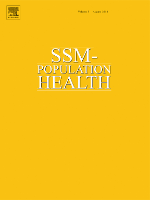
SSM-Population Health
Empowering research for a healthier tomorrow.SSM-Population Health, published by ELSEVIER SCI LTD, stands as a prestigious platform dedicated to advancing our understanding of population health dynamics. As an Open Access journal since 2015, it fosters a culture of knowledge sharing, allowing researchers, professionals, and students to access high-quality research without barriers. With exceptional rankings in the 2023 category quartiles—Q1 in Health Policy, Health (social science), and Public Health, Environmental and Occupational Health—the journal emphasizes its influential role in shaping public health discourse and policy. Its notable Scopus rankings place it in the top deciles of various health-related fields, underlining its impact on contemporary health issues and research. SSM-Population Health invites contributors to address pressing questions and solutions within the realm of population health, making it a vital resource for those aiming to make an impact in this ever-evolving field.
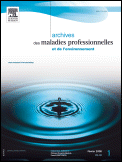
Archives des Maladies Professionnelles et de l Environnement
Fostering Dialogue on Health, Work, and EnvironmentArchives des Maladies Professionnelles et de l'Environnement is a vital scholarly journal published by Elsevier Science Inc, focusing on the critical intersections of public health, environmental issues, and occupational health. With an ISSN of 1775-8785 and an E-ISSN of 1778-4190, this French-based journal serves as a platform for researchers, professionals, and students to explore contemporary challenges and advancements in these essential fields. Although it holds a Q4 ranking in the 2023 Scopus quartiles, it provides a unique opportunity for new contributions that can drive future research directions. The journal accepts a variety of article types, with the aim of spreading knowledge that can influence policy and improve practices in occupational health and environmental safety. As we approach the convergence of its publication years from 2004 to 2024, the journal remains committed to fostering a comprehensive understanding of the impact of work and environmental exposure on health, making it an important resource for anyone invested in these disciplines.

OCCUPATIONAL AND ENVIRONMENTAL MEDICINE
Elevating standards in occupational and environmental health.OCCUPATIONAL AND ENVIRONMENTAL MEDICINE is a leading academic journal dedicated to the field of public health, with a specific emphasis on environmental and occupational health. Published by the esteemed BMJ PUBLISHING GROUP, this journal has established itself as a crucial resource for researchers, professionals, and students alike, achieving a remarkable impact factor that reflects its high-quality research contributions. With a distinguished Q1 ranking in its category and a strong position in Scopus rankings—placing it at #59 out of 665—this journal showcases top-tier studies and findings from 1994 to its anticipated convergence in 2024. Set in the United Kingdom, the journal aims to advance understanding and practices relating to health in the workplace and environmental settings, making it an indispensable platform for the dissemination of knowledge in this vital area. Although not an open-access journal, it provides a valuable repository of articles that influence policy and practice worldwide, ensuring that critical information is accessible to those dedicated to promoting safer, healthier working and living environments.
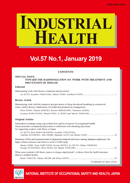
INDUSTRIAL HEALTH
Advancing Safety and Health in the WorkplaceINDUSTRIAL HEALTH is a premier journal dedicated to the dissemination of innovative research in the fields of public health, environmental and occupational health, as well as toxicology and mutagenesis. Published by the National Institute of Occupational Safety and Health in Japan, the journal has been a critical resource for over six decades, covering essential topics from 1963 to the present day. With an impressive placement in the second quartile (Q2) of the Public Health, Environmental and Occupational Health category and a third quartile (Q3) in Health, Toxicology, and Mutagenesis, it is recognized for its significant contribution to advancing knowledge and improving practices within the industry. While not an open-access journal, INDUSTRIAL HEALTH offers researchers and students access to a wealth of knowledge through its rich archive of articles, fostering a deeper understanding of health and safety challenges in industrial settings. The journal’s dedication to high-quality research and its strategic role in promoting occupational safety make it an invaluable asset for professionals seeking to enhance health standards and safety protocols worldwide.
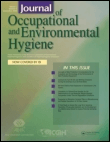
JOURNAL OF OCCUPATIONAL AND ENVIRONMENTAL HYGIENE
Leading the Charge in Environmental Health InsightsJOURNAL OF OCCUPATIONAL AND ENVIRONMENTAL HYGIENE is a leading publication within the fields of Occupational and Environmental Health, dedicated to advancing the understanding and practice of hygiene in various workplaces and environments. Published by Taylor & Francis Inc, this journal is committed to disseminating high-quality research and reviews that address critical issues affecting public health and occupational safety. With an Impact Factor that situates it in the Q3 quartile of 2023 in both Public Health and Environmental and Occupational Health categories, the journal ranks at #309 out of 665 in its field according to Scopus, demonstrating its relevance and influence among peers. The journal accepts articles that contribute to the scientific discourse on the intersection of work environments and health outcomes, further fostering interdisciplinary collaboration. Operating on an open-access model, the JOURNAL OF OCCUPATIONAL AND ENVIRONMENTAL HYGIENE ensures that vital research is accessible to professionals, policymakers, and students alike, supporting the global endeavor of enhancing health and safety standards across diverse sectors. Explore the latest advancements and innovative studies through this impactful platform.
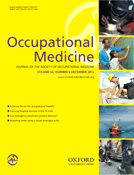
OCCUPATIONAL MEDICINE-OXFORD
Pioneering Research for Healthier Work EnvironmentsOccupational Medicine-Oxford is a leading journal in the fields of public health and occupational health, published by Oxford University Press. With an ISSN of 0962-7480 and an E-ISSN of 1471-8405, this esteemed journal has been disseminating critical research findings since its inception in 1948. Ranked in the Q2 category for both Medicine (miscellaneous) and Public Health, Environmental, and Occupational Health, it occupies a significant spot in the academic community, with a Scopus ranking of #147 out of 665 in its categories, placing it within the 77th percentile. The journal aims to enhance the understanding of occupational health issues and promote practices that improve worker safety and well-being. As a vital resource for researchers, professionals, and students alike, Occupational Medicine-Oxford provides insights into emerging trends, comprehensive reviews, and original research articles that pave the way for future innovations in occupational health strategies. Explore the journal for the latest developments in this critical field, and gain access to a wealth of knowledge that can make a meaningful impact on public health policies and occupational practices worldwide.

Journal of Agricultural Safety and Health
Fostering a culture of safety in the agricultural community.Journal of Agricultural Safety and Health is a premier publication dedicated to advancing the knowledge and practice of safety and health in agricultural environments. Published by the American Society of Agricultural and Biological Engineers, this journal has been a vital resource since its inception in 1997, providing a platform for research that addresses critical issues related to occupational safety, risk management, and public health in the agricultural sector. With an ISSN of 1074-7583 and an E-ISSN of 1943-7846, the journal is indexed in various databases and achieves recognition in the academic community, notably being categorized in Q3 for Agricultural and Biological Sciences and Safety, Risk, Reliability and Quality, and Q4 for Public Health and Environmental Health in the latest rankings. Researchers, practitioners, and students can access valuable insights and findings that not only reflect the current state of agricultural safety but also guide future improvements in health standards and practices. As the field continues to evolve, the Journal of Agricultural Safety and Health remains committed to its mission of promoting safety and health in agricultural work, ensuring that the community thrives in a safe and productive environment.

Epidemiologia & Prevenzione
Advancing public health through rigorous epidemiological research.Epidemiologia & Prevenzione is a distinguished journal published by INFERENZE SCARL based in Italy, focused on advancing the fields of epidemiology and public health. Established in 1987, this journal serves as a pivotal platform for researchers, practitioners, and students to disseminate and exchange important findings related to epidemiology, as well as environmental and occupational health. With an HIndex that reflects its growing academic influence, it currently holds a Q3 quartile ranking in both Epidemiology and Public Health, highlighting its relevance in the scientific community. The journal is indexed in Scopus, ranked #368 in the field of Public Health and Environmental and Occupational Health, and #87 in Epidemiology, showcasing its commitment to high-quality research. Although it operates without an open access model, Epidemiologia & Prevenzione remains a vital resource in promoting knowledge and innovation for a healthier society, making it essential reading for anyone invested in these critical areas of study.

GEFAHRSTOFFE REINHALTUNG DER LUFT
Connecting science and policy for a sustainable atmosphere.GEFAHRSTOFFE REINHALTUNG DER LUFT is a reputable academic journal published by SPRINGER-V D I VERLAG GMBH & CO KG, dedicated to the critical examination of air contamination and its implications on public health and environmental policy. With an ISSN of 0949-8036 and an E-ISSN of 1436-4891, this journal has established itself as a key resource for researchers, professionals, and students alike since its inception in 1996. Operating under a stringent peer-review process, it focuses on various aspects of air quality management, toxicology, and the legal frameworks governing pollution control. Although categorized in the Q4 quartile for multiple areas including Health, Toxicology and Mutagenesis and Management, Monitoring, Policy and Law, the journal continues to play an important role in disseminating relevant research that aids in the understanding and mitigation of air pollution issues. As of 2023, it ranks in the 7th percentile across several environmental science categories, reflecting its niche but impactful presence in the field. Researchers looking to stay ahead in the study of air quality are encouraged to explore this journal, which is set to converge its insights through 2024 and beyond.
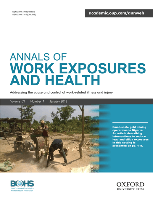
Annals of Work Exposures and Health
Connecting professionals with cutting-edge findings.Annals of Work Exposures and Health, published by Oxford University Press, stands as a leading journal dedicated to the field of public health with a particular focus on environmental and occupational health issues. Since its inception in 2016, the journal has provided a robust platform for disseminating high-quality research, boasting an impressive impact factor that reflects its rigorous peer-review process and significant contribution to advancing knowledge in the field. With its open access model, the journal ensures that critical findings are readily available to researchers, professionals, and students, fostering a collaborative spirit in tackling the challenges associated with work-related health exposures. As of 2023, it ranks in Q2 in its category, positioned within the 69th percentile in Scopus, illustrating its influence and relevance in the ongoing discourse surrounding occupational health. The Annals continues to attract diverse contributions that aim to inform policy and practice, making it an essential resource for anyone involved in public health research and advocacy.